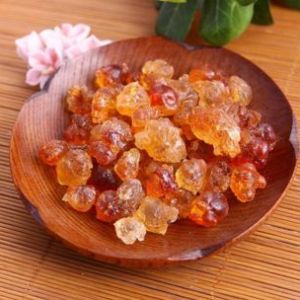Acacia senegal
Product Registration Number:F20180000365
Product Description
Acacia senegal is a white to yellowish flake, granule or powder and is a polysaccharide extracted from natural plants. Acacia senegal consists of two components, 70% of which are composed of polysaccharides containing no N or a small amount of N, and the other consisting of protein structures with high molecular weight; polysaccharides are covalently bonded with hydroxyl groups in protein peptide chains. The combination of proline and serine has a total protein content of about 2%, and the special variety can be as high as 25%. The polysaccharide molecule linked to the protein is a highly branched acidic polysaccharide having the following composition: D-galactose 44% , L-arabinose 24%, D-glucuronic acid 14.5%, L-rhamnose 13%, 4-O-methyl-D-glucuronic acid 1.5%; β-D-pyridyl in the Acacia senegal backbone Galactose is linked by a 1,3-glycosidic bond, and the side chains are linked by a 1,6-glycosidic bond.
Application Range
Acacia senegal is mainly used as a suspending agent and emulsifier in oral and topical pharmaceutical preparations, and as a binder for tablets.
Product Advantages
Acacia gum is extracted from natural plants and has higher safety.
Precautions
Acacia aqueous solution is easily degraded by bacteria or enzymes and needs to be sterilized before storage.
Many salts can reduce the viscosity of the aqueous Acacia senegal solution, and the trivalent salt will cause condensation.
Arabic gum is derived from exudates collected from the trunk of Acacia. It has been used for 4000 years. Because it is safe and non-toxic, the dosage is not specified. It is yellow to light yellowish brown translucent block, or white to light yellow particles and powder. The lighter the color, the better the quality. The fresh appearance is smooth, the interior is transparent, odorless and tasteless. It is easily soluble in water, and can be dissolved in hot water and cold water to form a clear and sticky thick liquid. Its application in food depends on its protection and stabilization of colloid, its stickiness and thickening, and its low digestibility in food formula with low calorific value. It can prevent the recrystallization and thickening of candy when used in candy making. In the candy, the fat can be evenly distributed in the whole body to prevent the formation of oxidized multi lipid surface layer. In dairy products, a large amount of water can be combined and maintained in the form of hydration. The bread surface can be filled with a sense of smoothness in the center of bread. Transparent brightener, sugar coating and snacks can be made to make the sugar coating stable and have the characteristics of free flow and adhesion to the bread surface. It can also be used as fragrance stabilizer, beverage emulsifier and beer foam stabilizer.







